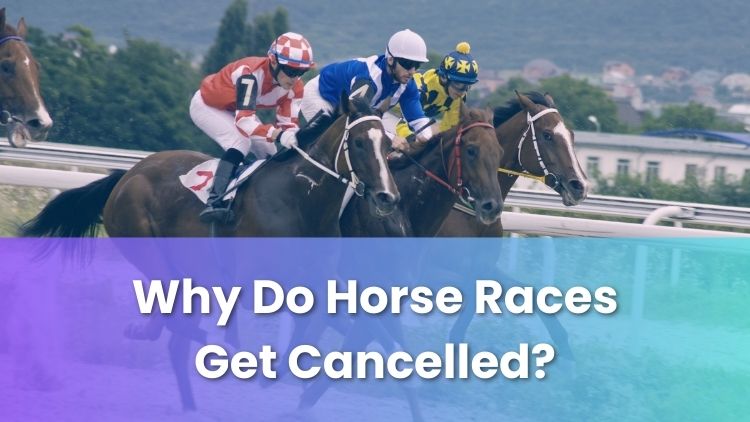
Have you ever planned to attend the horse racing, only to discover at the last minute that it’s cancelled? It’s only natural for the prospective attendees to feel confusion and disgruntlement at this; often at times the cancellations seemingly come out of nowhere.
Whilst it can be frustrating, it’s important to keep in mind that it is likely due to an event outside of the control of the organiser.
In this blog post, we intend to explain the unforeseen circumstances which may cause abrupt cancellations- knowing this information could help you to feel better prepared in the eventuality that you ever experience this.
Can Horse Races Get Cancelled?
Yes, horse races can indeed be cancelled, and this is always for a good reason. The decision to cancel a race is not taken lightly, as it affects many people, from organisers to spectators.
A focus on ensuring safety and fairness underpins every decision made in the sport. Those who attend should appreciate the stringent approach taken by race organisers. While it might be disappointing, any cancellations reflect a dedication to maintaining the integrity and safety of horse racing.
What Causes Horse Racing To Be Cancelled?
Weather is often at the forefront when it comes to deciding if a race can safely proceed. Severe weather conditions such as heavy rain, snow, or thick fog are significant concerns.
These conditions can make tracks treacherous and compromise the safety of both horses and jockeys. Problems like poor visibility or slippery surfaces are common reasons for delaying or cancelling a race.
In addition to weather, the health and safety of the horses and riders are paramount. An outbreak of illness among the horses can prompt organisers to cancel events, as a preventive measure to stop any potential spread.
During routine safety inspections, any issues discovered on the tracks might deem them unsuitable for racing.
Technical problems can also disrupt plans. Any faults with racecourse facilities or malfunctioning essential equipment can make it impractical or unsafe to hold the event.
Unexpected circumstances such as worker strikes or logistical challenges can occasionally cause disruptions too. Although these are less frequent, they can still affect the running of an event.
With an understanding of these varied causes, it becomes easier to appreciate the complexities of organising horse races and the significance of prioritising everyone's safety and well-being.
How Often Do Horse Races Get Cancelled?
Horse races don't get cancelled all that frequently. Most events go ahead as planned, thanks to meticulous preparations made by organisers who work hard to ensure everything runs smoothly. However, like anything that relies on outdoor conditions and logistics, cancellations are sometimes necessary.
Most cancellations tend to be the exception rather than the rule, due to the careful attention given to preparation and planning. Keeping this in mind can help set realistic expectations, while still allowing for an enjoyable experience when attending the races.
What Happens When a Horse Race Gets Cancelled?
When a horse race is cancelled, various steps are taken to manage the situation smoothly. Communication is key, and race organisers will quickly inform participants and the public.
If you have purchased a ticket, check with the racecourse for their policy- often, they offer options like refunds or rescheduling for a future event.
For those who have placed bets, bookmakers usually have specific rules in place for cancellations. It's a good idea to review these terms, as you might receive a refund or see your bet carried over to another event.
Behind the scenes, racecourses work with staff, trainers, and jockeys to reorganise their schedules. They aim to minimise disruption and plan for the next race day with safety and efficiency in mind.
Understanding these procedures can help ease the disappointment and provide clarity on what steps to expect in the event of a cancellation.
**The information provided in this blog is intended for educational purposes and should not be construed as betting advice or a guarantee of success. Always gamble responsibly.
